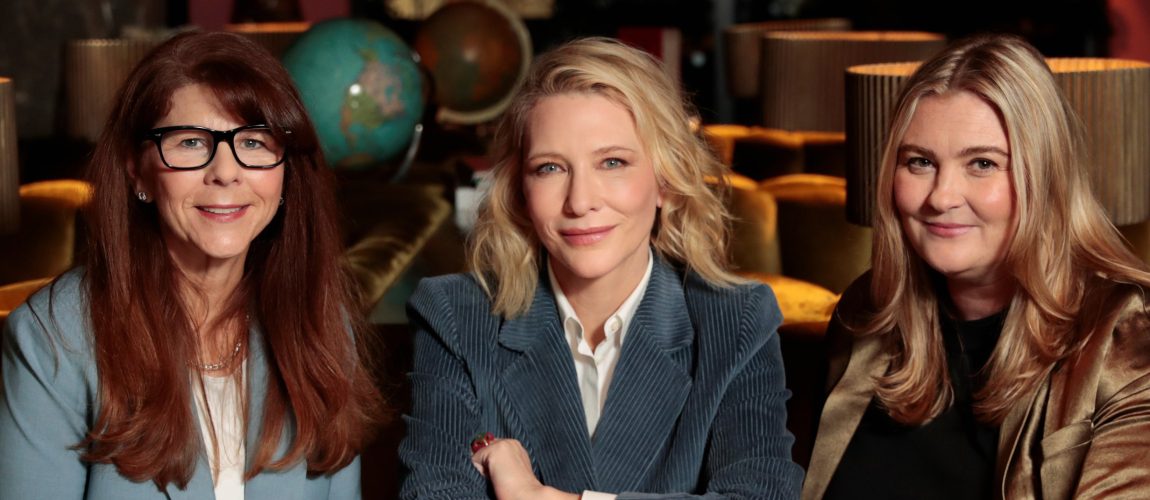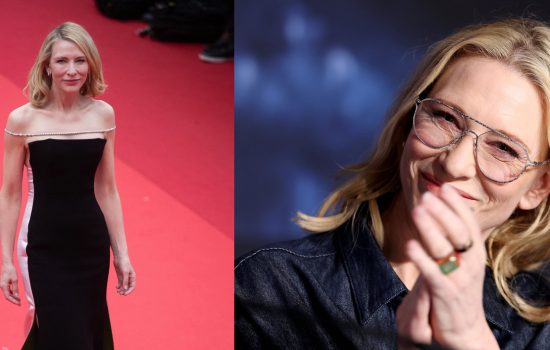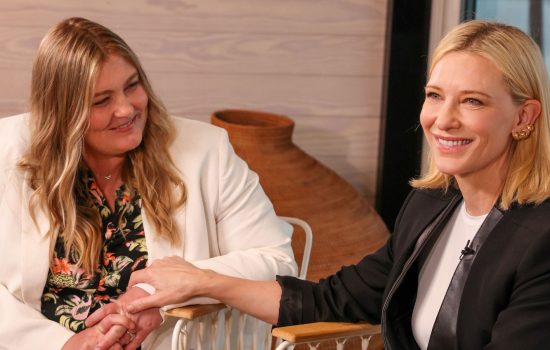Dirty Films, Annenberg Inclusion Initiative, and Netflix have unveiled the selection committee for their Proof of Concept program, “the program’s goal is to identify the next generation of filmmaking talent whose stories promote the perspectives of women, trans, and non-binary people.”
The Proof of Concept Accelerator is excited to unveil its selection committee, consisting of ten members of the entertainment industry with decades of experience and a shelf of top accolades. The program, supported by the Netflix Fund for Creative Equity, was announced in December 2023 by Academy Award® winner Cate Blanchett and Emmy®-nominated producer Coco Francini of Dirty Films, and Dr. Stacy L. Smith, founder of the Annenberg Inclusion Initiative. It is designed to produce audaciously authored work that elevates the perspectives of women, trans, and non-binary people by financially backing short proof of concept films, providing mentorship, and publicly showcasing the completed films.
We (Cate Blanchett, Coco Francini, Dr Stacy L. Smith) are pleased to announce our Selection Committee for #ProofofConcept initiative funded by ?@netflix? Fund for Creative Equity. ?@dirtyfilms? #ascj pic.twitter.com/u9tv65kYcp
— Annenberg Inclusion Initiative (@Inclusionists) March 25, 2024
“We are grateful for the willingness of so many industry leaders to come together and support this accelerator,” said Cate Blanchett, Coco Francini, and Dr. Stacy L. Smith. “This demonstrates the capacity for some of the most talented and prolific storytellers to extend a hand to the next generation and offer their insight and influence to see these filmmakers succeed.”
Alongside program leadership, the selection committee will evaluate submissions from Proof of Concept finalists. Ultimately, eight filmmakers will be selected to take part in the program. Selected participants will be given $50,000 to support the creation of a short film, receive mentorship from industry experts, and have their films screened at a showcase later this fall.
Applications for Proof of Concept closed on February 16 and the final participants will be announced later this spring. The program received a deluge of interest, with over 1,200 applications.
The applicant pool represents an incredibly diverse group of filmmakers, with demographics of people who represent marginalized genders, races and ethnic groups over indexing entertainment industry averages. Of all applicants, 85% identified as women, 2% as men, and 9% as non-binary. A total of 8.5% were transgender. From 2007 to 2023, only 6% of the directors of the 1,700 top-grossing movies were women, and only 2 were transgender.
The applicants also represented a range of racial/ethnic groups: 16% were Black/African American, 13% were Hispanic/Latino, 14% were Asian, 5% were Middle Eastern/North African, 2.2% were Indigenous, and 1.2% were Multiracial/Multiethnic. Overall, 52% were people of color. In comparison, 22.7% of directors of the top-grossing films between 2007 and 2023 were from underrepresented racial/ethnic groups. In addition, the applicant pool for Proof of Concept also outperformed the percentage of top-grossing film directors across racial/ethnic groups.
“Filmmakers from these communities are currently overlooked for the top jobs, but when we reached out, they answered our call. The overwhelming response to Proof of Concept is a demonstration to the greater entertainment industry that there is a vast group of underrepresented filmmakers with the interest and talent to graduate to large-scale filmmaking. Our goal is to now showcase the remarkable array of voices that are ready to be hired,” said Blanchett, Francini, and Dr. Smith.
The accelerator is designed to address the ongoing disparities facing women, trans, and non-binary people in top-grossing films. According to data from Dr. Smith and the Annenberg Inclusion Initiative, across the 1,700 top-grossing films from 2007 to 2023, only 6% of directors were women and 31% of leads/co-leads were women. The Proof of Concept accelerator intends to address these gaps by supporting audaciously authored work that will break into the highest levels of filmmaking.
More details on the program here.
Cate Blanchett Says Proof of Concept Program Is Different Because It’s ‘Intensely Practical’
Cate Blanchett and her producing partner Coco Francini told IndieWire the tagline for their new diversity grant program should be “Intensely Practical.” OK, so it was at least partially a joke based on an off-the-cuff remark by Blanchett, but it’s also not a bad differentiator between their incubator and others.
The numbers from the pool of applicants prove “it’s not about talent; it’s really about access and opportunity, and that’s been lacking,” Dr. Stacy Smith said.
Blanchett concurs.
“I have seen so many fascinating, interesting films made by…marginalized voices that just do not get the chance to be seen by an audience,” Blanchett said.
Why? The studios and distributors “don’t know how to market” them, Blanchett continued. “They don’t know how to talk about it. There’s this ridiculous notion that somehow people wouldn’t be interested in those perspectives.”
Blanchett, Francini, Smith, and their A-list committee are interested.
“As producers we were constantly — and we’re not alone — looking for authored points of view that you haven’t encountered before. But if you don’t invite diverse perspectives and points of view onto the table early, that doesn’t actually happen,” Blanchett said. “It’s been my personal experience and I know the experience of probably every single person in various different ways on the selection committee, that we’ve encountered similar frustrations. So rather than looking at the data and feeling powerless, we’re really excited to do something intensely practical.”
Blanchett and friends will approach the grant program’s projects the same way they would produce any indie feature, she said, making sure the filmmaker has all the resources they need to get the project made. All the resources, and the right resources.
“This is not a cookie-cutter program,” Blanchett said. “It’s the first time we’ve done it. So we’ve got to be aligned to what each project needs.”
The recipients of the grants will be announced later this spring.
Blanchett and Francini are hoping at least one of the eight shorts that come out of the program turn into a studio feature or series, perhaps even on Netflix. That brings us to practicality number 3: Netflix. The Netflix Fund for Creative Equality is among the incubator’s backers. There is no guarantee of placement on Netflix for the incubator’s projects, but you never know.
Of course, the ultimate goal of the program is for the program to have no reason to exist, Blanchett says: “Wouldn’t it be great if it was unnecessary in five years time?”
Full interview on Indiewire
Cate Blanchett on Recruiting Proof of Concept Selection Committee
Lily Gladstone has always been a huge fan of Cate Blanchett and now, fresh off joining her acting idol in the elite realm of best actress Academy Award nominees, the two women are teaming up.
Not on screen (yet), but for a greater cause.
Gladstone is among the boldfaced names joining the selection committee for Proof of Concept, an accelerator program focused on supporting the perspectives of women, trans and non-binary people by financially backing their short “proof of concept” films.
“It came together very rapidly,” Blanchett tells Variety about assembling this powerhouse group of filmmakers. “We asked and everyone said ‘Yes’ immediately.”
She continues: “Obviously, we’ve all been feeling the need for a program like this. It’s essential to the vitality of the business to have initiatives like this. I mean, they’re all incredibly busy people, but they felt the urgency and the opportunity in this, which was really exciting.”
In the case of Gladstone, for example, she and Francini got talking at an event during the “Killers of the Flower Moon” star’s awards season campaign. “I said, ‘Hey, you should really check out this study that Dr. Stacy Smith and the Annenberg inclusion initiative did about Native representation in cinema,” Francini recalls. “From there, it snowballed into a bigger relationship.”
The report in question revealed that less than one-quarter of 1% of more than 62,000 speaking characters in 1,600 movies were held by Native Americans, thus underscoring the importance of Gladstone’s role in the film and the “erasure and discrimination against” Indigenous people and their stories. The phenomena is precisely what Proof of Concept aims to combat by attacking the problem from the top down — by means of giving underrepresented filmmakers the opportunity to tell a diverse array of stories.
Adds Blanchett of Gladstone: “I have profound respect for her both as an advocate as well as an actress. She’s incredibly generous and will make a wonderful mentor.”
“It’s really important to make sure all intersectional identities are represented. That this cross section of folks on the selection committee really represent, as much as we possibly can, a variety of different groups whose stories are necessary and are imaginative and have not been told,” Smith explains. “Since day 1, Coco has been adamant about finding ‘audaciously authored’ stories. So, the selection committee and the folks that that submitted their dossiers to this program really represent the world that we live in.”
Will the selection committee members serve as mentors as well?
COCO FRANCINI: We want to create the program in a bespoke way. So, depending on who the participants are they might have different needs in terms of mentorship. Often in these programs, you get paired with a mentor and it may be a meeting you have once and that’s great, but we want to build a structure of meaningful mentorship and support. So some people might have two mentors, some people might have four. All these people certainly want to engage in the program in various different ways, but there’s more to come.
CATE BLANCHETT: The program addresses the obvious barriers that a lot of these filmmakers will have to entering the industry: that’s funding and that’s exposure and that’s mentorship. But the other thing that’s beneficial, which I’m already experiencing, is that active community-building.
By having a selection committee you’re activating a community from the get go, which is super important because, just speaking from personal experience, the wonderful thing about the data that Stacy has collected is that it makes you feel like you’re not going crazy. That the things that you feel out there are being felt by other people. And have been felt not just in this moment in time — because obviously there’s some very experienced filmmakers who are part of the selection committee and will hopefully be mentors — but that have been felt across time.
What was the reasoning that someone of this group gave for wanting to be involved?
FRANCINI: Several people that are involved in the selection committee, have been doing this kind of advocacy, in their own lives already. Lilly Wachowski has Anarchists United. Jane Campion has A Wave in the Ocean. We want to join hands with other people who are doing this work and try to amplify everyone’s efforts and create an ecosystem change.
Olivia Colman made headlines over the weekend talking about pay disparities for women in Hollywood – how does a program like Proof of Concept address that trickle down aspect of how who is behind the camera also affects that conversation?
BLANCHETT: Change and inclusivity are scary concepts to a lot of people who are in positions of power. What I love about this program is that it addresses the fear and it addresses the failure of the imagination. Which is ironic that we’re talking about a failure of being able to imagine a more inclusive, diverse and therefore less homogenous and more exciting industry when we are an industry whose main tool is meant to be the imagination.
I’m very excited to begin. Because whenever one becomes a mentor to someone else or engages in a program like this from an advocacy perspective, you grow yourself as an artist because you’re exposed to ideas that you wouldn’t have otherwise heard about. So now the really exciting stuff begins. The stats are behind us. They’re shocking, but exciting in the way that the more we circulate them, the more we talk about them, the more we think this is not okay. And it’s also not leading us to a very exciting creative future for the industry.
Full interview on Variety
Source: Netflix
 Welcome to Cate Blanchett Fan, your prime resource for all things Cate Blanchett. Here you'll find all the latest news, pictures and information. You may know the Academy Award Winner from movies such as Elizabeth, Blue Jasmine, Carol, The Aviator, Lord of The Rings, Thor: Ragnarok, among many others. We hope you enjoy your stay and have fun!
Welcome to Cate Blanchett Fan, your prime resource for all things Cate Blanchett. Here you'll find all the latest news, pictures and information. You may know the Academy Award Winner from movies such as Elizabeth, Blue Jasmine, Carol, The Aviator, Lord of The Rings, Thor: Ragnarok, among many others. We hope you enjoy your stay and have fun! 




 A Manual for Cleaning Women (202?)
A Manual for Cleaning Women (202?) The Seagull (2025)
The Seagull (2025) Bozo Over Roses (2025)
Bozo Over Roses (2025) Black Bag (2025)
Black Bag (2025)  Father Mother Brother Sister (2025)
Father Mother Brother Sister (2025)  Disclaimer (2024)
Disclaimer (2024)  Rumours (2024)
Rumours (2024)  Borderlands (2024)
Borderlands (2024)  The New Boy (2023)
The New Boy (2023) 











